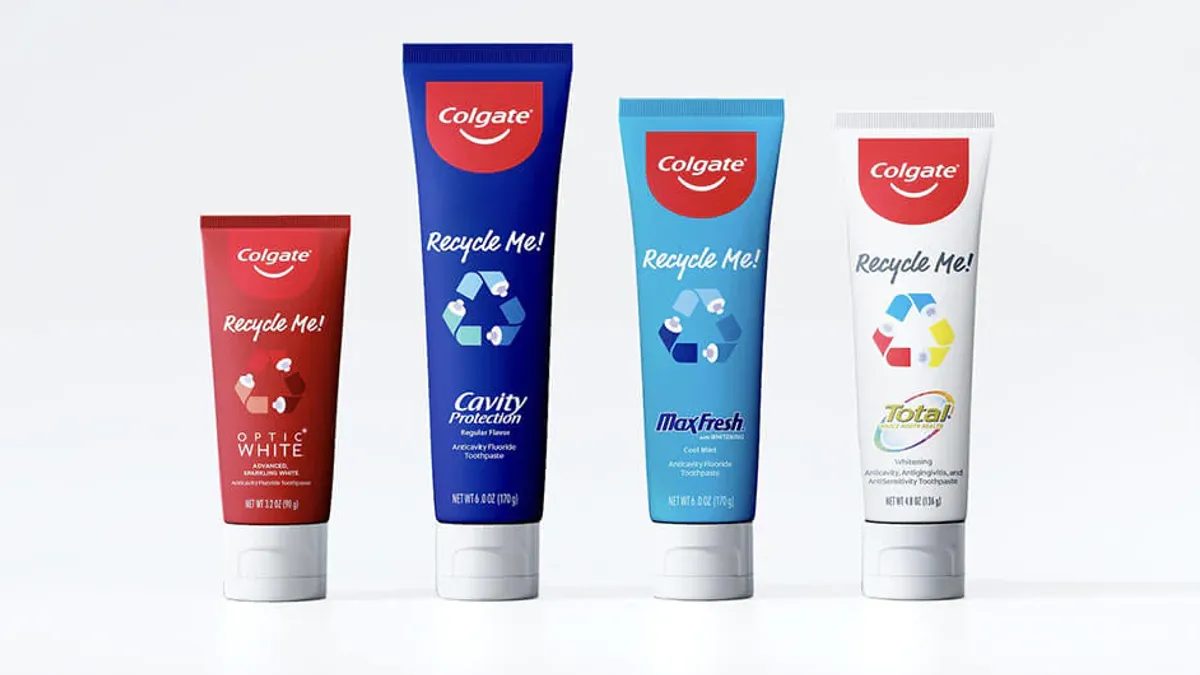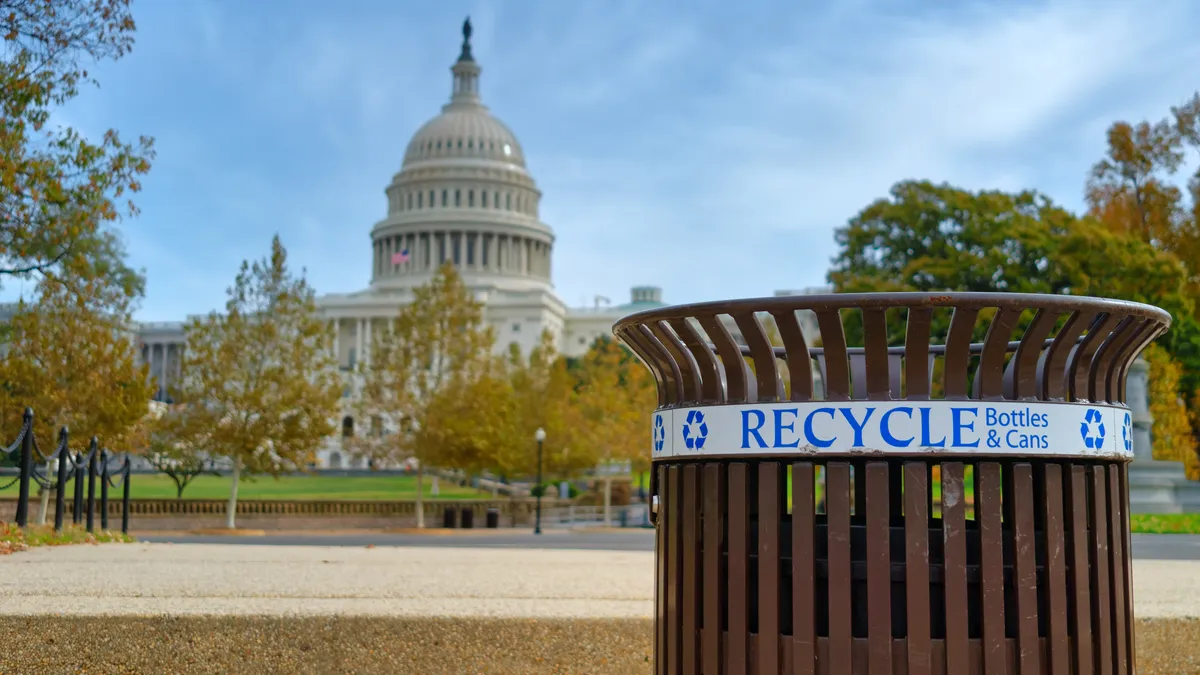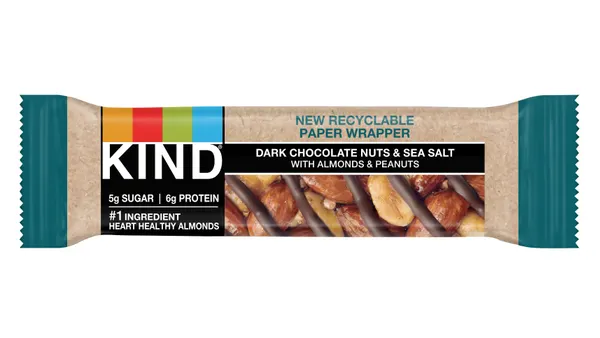A judge on Tuesday denied Colgate-Palmolive’s request to dismiss a lawsuit brought by consumers who say the company’s recyclability claims on certain types of toothpaste packaging is “false, deceptive, misleading and/or unlawful.”
Colgate introduced a “breakthrough” recyclable tube in February 2022, explaining that the monomaterial HDPE tube can be recycled alongside other No. 2 HDPE containers such as milk or detergent jugs. Conventional toothpaste tubes typically are made from multiple different material layers, making them more difficult to recycle than monomaterial products.
Consumers initiated the case against Colgate last August, aiming for a class action suit. At issue are statements on some Colgate and Tom’s of Maine toothpastes that show “recyclable tube,” “first of its kind recyclable tube” and/or the chasing arrows universal recycling symbol.
In his decision on Tuesday that allows the lawsuit to proceed, Judge Joseph Spero of the United States District Court for the Northern District of California rejected multiple of Colgate’s opposition points, deeming certain arguments “unpersuasive.” He concluded that a reasonable consumer might be misled by some of the recyclability messaging and that “Colgate has pointed to no disclaimers that render the statements on its Products concerning recyclability to be non-misleading as a matter of law.” Spero pointed out that deceptive advertising claims are rarely dismissed.
Neither the plaintiffs’ lawyers nor Colgate-Palmolive responded to a request for comment.
Tube trials and tribulations
As the product launched, Colgate embarked on an educational campaign to “build awareness of recyclable tubes not only among consumers, but also the operators of the Materials Recovery Facilities (MRFs) that sort plastic, reprocessors that make resin from recycled plastic, and other recycling stakeholders.” The brand described plans for a recyclable tube pilot program — in partnership with other companies, a MRF and reprocessor — to identify best practices that could be shared nationwide.
Colgate acknowledged at the time that tube recycling success would require a “critical mass of tubes on shelf that meet recycling standards” and that other major toothpaste brands had also committed to switching to recyclable HDPE tubes by 2025. However, it said that “[d]uring this transition phase, acceptance of tubes at certain recycling facilities may be limited, and consumers should check with their local community facilities.”
The lawsuit’s plaintiffs reported purchasing the toothpaste thinking they could recycle the tubes curbside, and said they wouldn’t have purchased it — or would have paid less — if they had known their municipal recycling programs in California didn’t accept the product. The lawsuit states only a “miniscule number of consumers” in California and across the country can recycle the HDPE tubes, because few facilities accept them. The lawsuit claims Colgate-Palmolive knows most recycling facilities do not accept the packaging and that it ends up in a landfill or incinerator.
The lawsuit accuses Colgate of violating the U.S. Federal Trade Commission’s Green Guides, the agency’s guidance on the marketing claims that companies can make on their packaging, saying the document rejects definitions of “recyclable” based on “theoretical recyclability.” The Green Guides say at least 60% of consumers in an area where a product is sold must have access to recycle it for it to be considered recyclable.
The great debate
The HDPE toothpaste tubes have faced debate in the two years since they launched: Do MRFs actually accept them?
Joy Rifkin, sustainability manager at Illinois-based recycler LRS, tackled the question during a session at November’s Packaging Recycling Summit, where speakers broke down which common household packaging is or isn’t recyclable. Rifkin admitted she had had to check with the operations director at LRS’ Chicago MRF.
Their initial testing showed the tubes technically can make it through LRS’s MRF because the optical sorters differentiate between the monomaterial HDPE tubes and multimaterial tubes. But widely advertising that pushes recyclers into touchy territory.
“Are we communicating that broadly? Absolutely not,” Rifkin said. “This is that tricky, gray area where we don't want to communicate something like, ‘Yeah, put your toothpaste in,’ and suddenly we're getting all of these toothpaste containers that are not like this unique brand of Colgate where it’s all HDPE.”
Rifkin emphasized that HDPE is a widely recyclable material in various companies’ facilities nationwide, mainly for tubs and jugs. But while Colgate-Palmolive’s concept of being a market leader with the recyclable tube seemed positive in theory, it isn’t necessarily currently practical.
“At this moment in time, I applaud Colgate and want to see what happens,” Rifkin said. “But I would not go into a classroom or a community group and say suddenly, ‘Yep, we want it — as long as it's this specific brand and made of this and all of these details added on.’”
The lawsuit against Colgate-Palmolive cites a Bloomberg Law article from 2022, 10 months after the HDPE tube launch, in which a WM representative said the tubes are not on the company’s list of accepted recyclables at its facilities. And a Republic Services representative noted concerns with toothpaste remnants potentially causing contamination in the recycling stream.
Colgate sought to dismiss the lawsuit on multiple grounds. For instance, it said the tubes’ labeling accurately portrayed the product’s HDPE content and HDPE’s widespread recyclability, the packaging included messaging that directed consumers to further information online, it met Green Guides standards for widespread recyclability of HDPE and it worked to educate the public and stakeholders, including with the messaging about limited acceptance during the transition phase.
The suit’s plaintiffs seek damages and an injunction to stop sales of the product, unless the packaging and marketing is altered to remove the recyclability claims or to qualify the availability of recycling programs. Colgate also sought to dismiss the injunctive relief because it had added a “check locally” disclaimer on the toothpastes’ outer carton, but the judge sided with the plaintiffs on that point as well.
A hearing for the case is scheduled for Friday.













